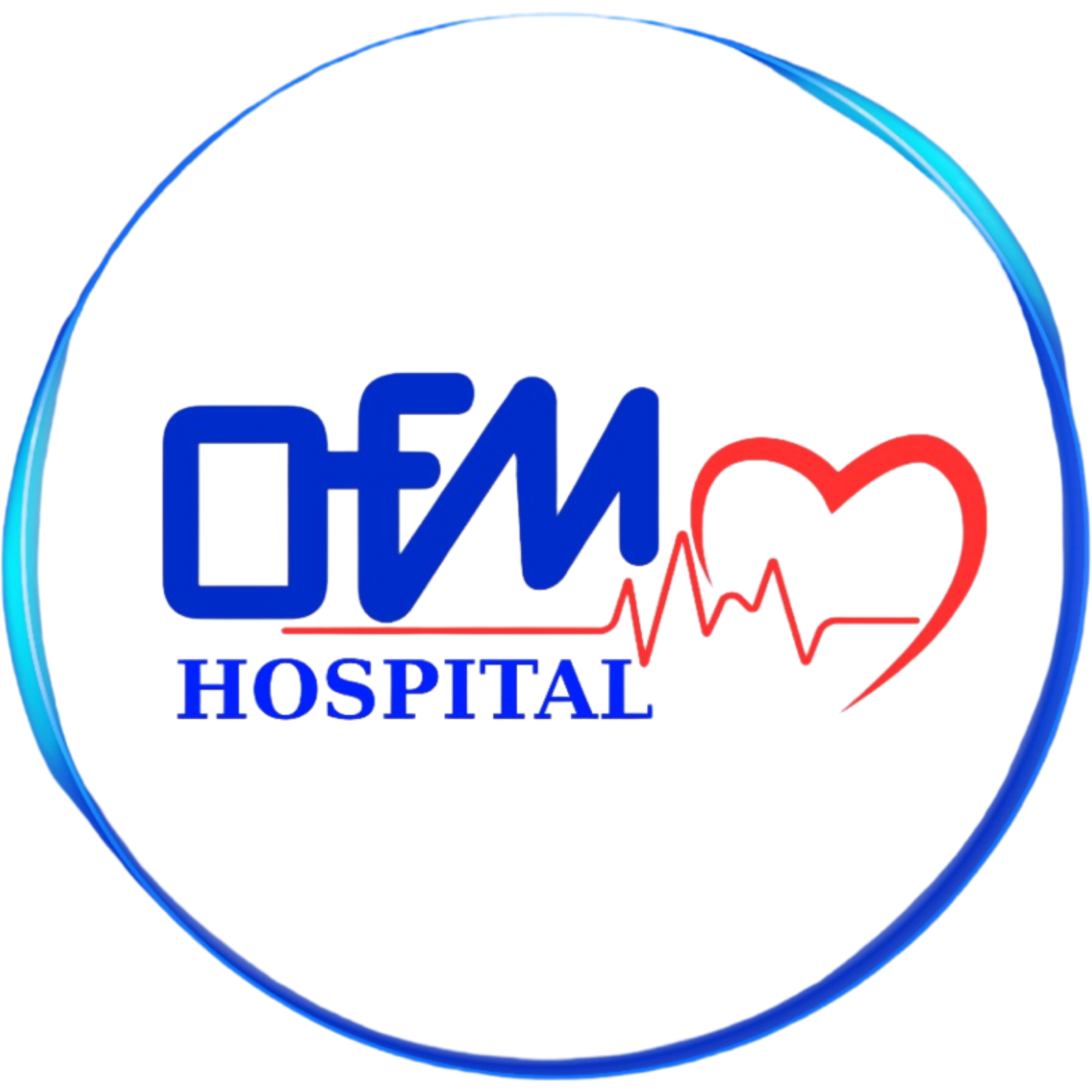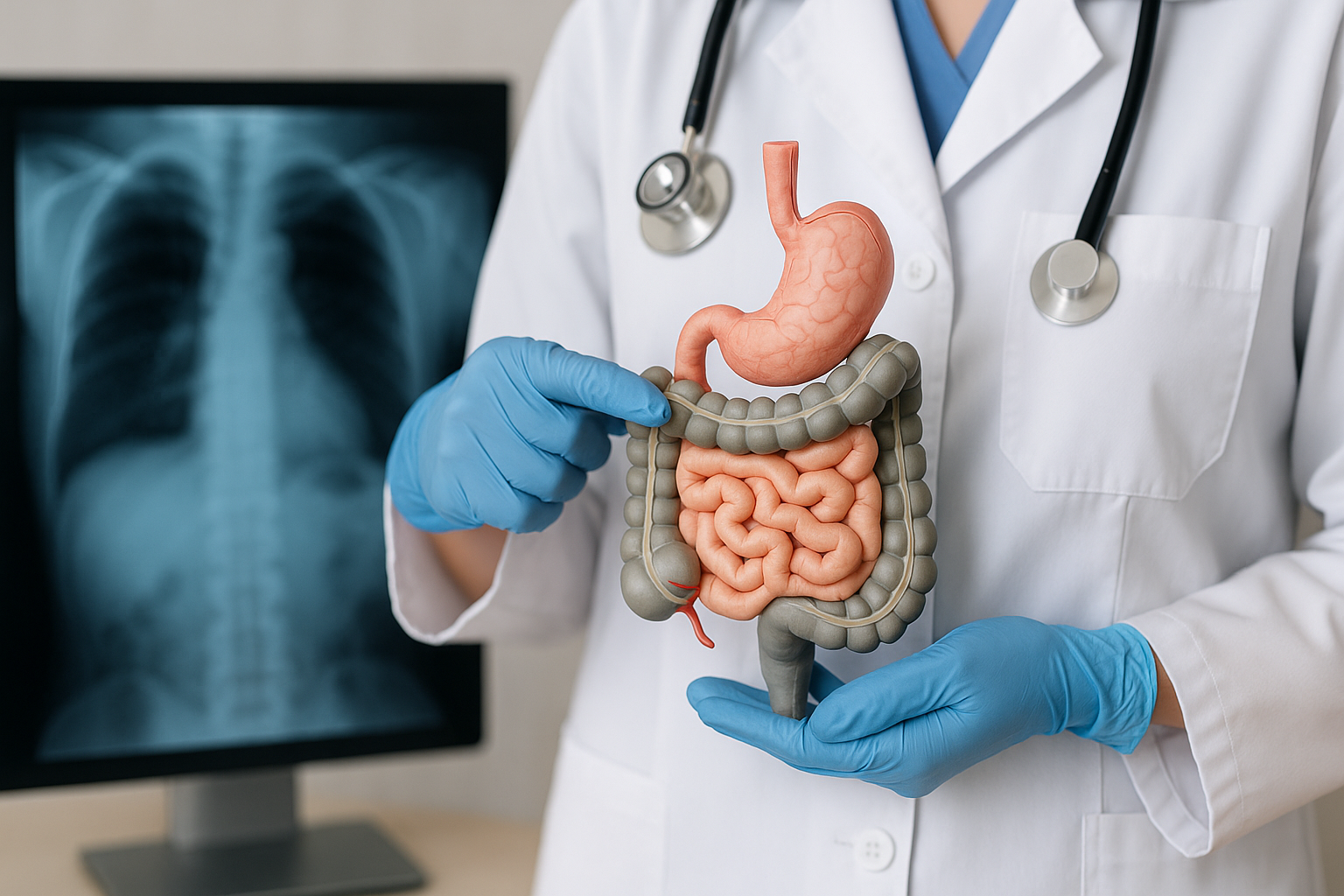Gastroenterology
- WHICH CONDITIONS DOES GASTROENTEROLOGY TREAT AND HOW ARE DIGESTIVE DISORDERS DIAGNOSED?
- HOW ARE STOMACH AND ESOPHAGEAL DISORDERS (REFLUX, GASTRITIS, ULCERS) TREATED?
- HOW ARE LIVER DISEASES AND HEPATITIS MANAGED?
- WHAT ARE THE DIAGNOSTIC AND TREATMENT OPTIONS FOR INTESTINAL DISORDERS?
- HOW ARE GALLBLADDER AND BILIARY TRACT DISEASES TREATED?
- WHAT ARE PANCREATIC DISEASES AND HOW ARE THEY MANAGED?
- HOW ARE COLON, RECTAL, AND LOWER GASTROINTESTINAL DISORDERS TREATED?
- HOW IS GASTROINTESTINAL BLEEDING DIAGNOSED AND MANAGED?
Gastroenterology focuses on the diagnosis and treatment of diseases involving the entire digestive system—including the esophagus, stomach, small and large intestines, liver, pancreas, gallbladder, and bile ducts. Because these organs work together to digest food, absorb nutrients, and eliminate waste, any disruption can lead to pain, digestive discomfort, malnutrition, or chronic illness.
Gastroenterologists treat a broad range of digestive disorders such as reflux disease (GERD), gastritis, peptic ulcers, celiac disease, irritable bowel syndrome (IBS), inflammatory bowel diseases (Crohn’s and ulcerative colitis), colon polyps, intestinal infections, hemorrhoids, fatty liver disease, viral hepatitis, gallstones, pancreatitis, and gastrointestinal bleeding. Symptoms such as abdominal pain, bloating, nausea, vomiting, heartburn, diarrhea, constipation, unintentional weight loss, or rectal bleeding often signal underlying digestive problems that require evaluation.
Diagnosis begins with a detailed medical history and physical examination. Laboratory tests—including complete blood count, liver enzymes, inflammation markers, and stool studies—help identify infections, inflammation, bleeding, or malabsorption. Imaging techniques such as ultrasound, CT scans, MRI, and abdominal X-rays are used to visualize internal structures and detect abnormalities such as gallstones, tumors, or organ enlargement.
One of the most critical diagnostic tools in gastroenterology is endoscopy, which provides direct visualization of the digestive tract.
-
Gastroscopy evaluates the esophagus, stomach, and upper small intestine.
-
Colonoscopy examines the large intestine and can detect polyps, inflammation, diverticula, and bleeding sources.
-
ERCP (endoscopic retrograde cholangiopancreatography) and EUS (endoscopic ultrasound) are advanced techniques used to diagnose bile duct, pancreatic, and deep gastrointestinal disorders.
Depending on the diagnosis, treatment may involve medication therapy, dietary adjustments, lifestyle changes, endoscopic procedures, or referral to surgery when necessary. At OFM Hospital, the gastroenterology team focuses on accurate diagnosis, early intervention, and long-term digestive health through evidence-based care and advanced endoscopic technologies.
Stomach and esophageal disorders are among the most common digestive problems and can significantly impact daily comfort, nutrition, and long-term health. Conditions such as gastroesophageal reflux disease (GERD), gastritis, and peptic ulcers occur when the protective lining of the esophagus or stomach becomes irritated or damaged. Symptoms often include heartburn, burning sensations behind the breastbone, upper abdominal pain, nausea, bloating, early fullness, sour taste in the mouth, cough, or difficulty swallowing.
Reflux (GERD) occurs when stomach acid flows back into the esophagus, causing irritation and chronic inflammation. Risk factors include obesity, smoking, large meals, hiatal hernia, stress, or certain foods such as caffeine, chocolate, acidic dishes, and spicy meals. Treatment focuses on lifestyle modifications—such as elevating the head during sleep, avoiding trigger foods, losing weight, and not lying down after meals—combined with medications like proton pump inhibitors (PPIs), H2 blockers, or antacids to reduce acid production. In severe, resistant, or structural cases, endoscopic or surgical procedures may be considered.
Gastritis, the inflammation of the stomach lining, can be caused by infections (especially Helicobacter pylori), excessive alcohol use, stress, medications such as NSAIDs, or autoimmune conditions. Diagnosis is often confirmed by gastroscopy, where biopsies may be taken to detect infection or inflammation. Treatment includes acid-suppressing medications, antibiotics for H. pylori, and dietary modifications to reduce irritation.
Peptic ulcers develop when stomach acid erodes the lining of the stomach or duodenum. These ulcers may cause burning pain, vomiting, weight loss, or bleeding in severe cases. Gastroscopy is the gold standard for diagnosis. Treatment typically involves PPIs to promote healing, antibiotics if H. pylori is present, and strict avoidance of irritants such as smoking, alcohol, and NSAIDs. In rare cases of complications—such as perforation or severe bleeding—endoscopic or surgical intervention may be required.
Long-term management focuses on preventing recurrence through personalized dietary guidance, stress control, medication regulation, and regular follow-up. At OFM Hospital, our gastroenterology team uses advanced diagnostic techniques and evidence-based treatments to manage reflux, gastritis, and ulcer diseases effectively, helping patients regain comfort and protect long-term digestive health.
The liver is one of the body’s most vital organs, responsible for detoxification, metabolism, digestion, and hormone regulation. When liver function is disrupted, a wide range of health problems can occur—from mild enzyme abnormalities to chronic inflammation, fibrosis, cirrhosis, and even liver failure. Gastroenterology plays a central role in diagnosing and treating these conditions, including fatty liver disease, viral hepatitis (A, B, C), autoimmune hepatitis, alcohol-related liver disease, and metabolic disorders affecting the liver.
Diagnosis begins with laboratory tests that measure liver enzymes (ALT, AST), bilirubin, coagulation factors, viral markers, and autoimmune indicators. Imaging techniques such as ultrasound, elastography, CT scans, or MRI help evaluate liver structure, detect fat accumulation, measure fibrosis severity, and identify masses or biliary obstruction. In complex or advanced cases, a liver biopsy may be required to obtain precise information about inflammation and scarring.
Fatty liver disease, now one of the most common liver disorders, may be related to metabolic syndrome, obesity, diabetes, or excessive alcohol consumption. Treatment focuses on lifestyle modifications, weight management, exercise, and controlling blood sugar and cholesterol levels. For alcohol-related fatty liver, complete alcohol cessation is essential.
Viral hepatitis requires targeted treatment depending on the virus type.
-
Hepatitis A is usually self-limiting but may require supportive care.
-
Hepatitis B and Hepatitis C can become chronic and lead to cirrhosis if untreated. Modern antiviral medications can suppress Hepatitis B and cure Hepatitis C in most patients.
Autoimmune hepatitis results from the immune system attacking liver cells and is treated with immunosuppressive medications such as corticosteroids and azathioprine. Early diagnosis is crucial to prevent progression to cirrhosis.
Cirrhosis, the final stage of chronic liver damage, leads to structural changes, reduced liver function, and complications such as ascites, variceal bleeding, encephalopathy, and increased cancer risk. Management focuses on preventing complications, monitoring liver function, treating infections, adjusting medications, and evaluating the need for advanced interventions. Regular ultrasounds and blood tests are essential for early detection of hepatocellular carcinoma (liver cancer).
At OFM Hospital, gastroenterologists provide comprehensive care using advanced diagnostics, antiviral therapies, nutritional management, and long-term monitoring to protect liver health and prevent disease progression.
Intestinal disorders affect the small and large intestines and can lead to abdominal discomfort, altered bowel habits, nutritional deficiencies, and chronic digestive problems. These conditions range from functional disorders like irritable bowel syndrome (IBS) to more serious inflammatory diseases such as Crohn’s disease and ulcerative colitis. Other common intestinal issues include celiac disease, diverticulitis, intestinal infections, malabsorption syndromes, polyps, and colorectal bleeding.
Diagnosis begins with a detailed evaluation of symptoms such as abdominal pain, bloating, diarrhea, constipation, gas, weight loss, fatigue, rectal bleeding, or changes in stool patterns. Laboratory tests—including stool analysis, inflammatory markers, anemia screening, and celiac antibodies—help identify infections, inflammation, bleeding, or nutrient absorption issues. Imaging methods such as abdominal ultrasound, CT, MRI, and contrast studies may be used to visualize structural abnormalities.
One of the most important diagnostic tools is colonoscopy, which allows detailed examination of the large intestine and direct removal of polyps, biopsy collection, and treatment of bleeding or inflammation. Endoscopic ultrasound (EUS), capsule endoscopy, and small bowel enterography may be used when deeper or small intestine lesions are suspected.
Irritable bowel syndrome (IBS) is a functional disorder characterized by abdominal pain, bloating, and alternating bowel habits. Treatment focuses on dietary modifications, stress management, probiotics, and symptom-specific medications.
Inflammatory bowel diseases (IBD)—Crohn’s disease and ulcerative colitis—cause chronic inflammation and require long-term care. Treatment may include anti-inflammatory drugs, immunosuppressants, biologic therapies, and nutritional management. Colonoscopy follow-ups are essential for monitoring disease progression and cancer risk.
Celiac disease involves an immune reaction to gluten and is managed with lifelong gluten-free nutrition. Regular monitoring ensures healing of the intestinal lining and prevention of deficiencies.
Diverticulitis, an infection or inflammation of pouch-like structures in the colon, is treated with antibiotics, dietary adjustments, and in severe cases, surgery.
Intestinal infections caused by bacteria, viruses, or parasites require targeted treatments based on stool test results.
Long-term management of intestinal disorders focuses on personalized nutrition plans, medication adjustments, and routine endoscopic monitoring. At OFM Hospital, our gastroenterology team uses advanced diagnostics and evidence-based therapies to treat intestinal conditions effectively and support long-term digestive health.
Gallbladder and biliary tract diseases are common digestive problems that affect the storage and flow of bile—an essential fluid produced by the liver to aid digestion, especially the breakdown of fats. When bile flow is disrupted by stones, inflammation, or obstruction, patients may experience severe abdominal pain, digestive discomfort, jaundice, or even life-threatening complications if left untreated.
The most frequent condition is gallstones (cholelithiasis), which form when components of bile—such as cholesterol or pigments—crystallize inside the gallbladder. Many gallstones remain silent, but symptomatic stones can cause upper right abdominal pain, nausea, vomiting, back pain, or indigestion, especially after fatty meals. Diagnosis is typically made with abdominal ultrasound, the most accurate and non-invasive imaging method.
When gallstones block the cystic duct, they can lead to acute cholecystitis, a painful inflammation of the gallbladder. Symptoms may include fever, persistent pain, and tenderness under the right rib cage. This condition often requires hospitalization, antibiotic therapy, and early surgical intervention.
Stones that migrate into the bile ducts can cause choledocholithiasis, resulting in jaundice, dark urine, pale stools, or pancreatitis. If infection develops, cholangitis may occur—an emergency condition requiring urgent treatment.
Treatment varies by severity:
-
Asymptomatic gallstones: Often only require monitoring.
-
Symptomatic gallstones or recurrent attacks: The most effective treatment is laparoscopic cholecystectomy, a minimally invasive surgery to remove the gallbladder. This prevents future attacks and complications.
-
Bile duct stones: Treated with ERCP (endoscopic retrograde cholangiopancreatography), where specialized instruments remove stones and relieve obstruction without the need for open surgery.
-
Inflammation or infection: Managed initially with antibiotics, hydration, and pain control before addressing the underlying cause.
Some patients experience biliary dyskinesia, where the gallbladder does not empty properly despite no visible stones. Diagnosis is made using HIDA scans, and treatment may also involve gallbladder removal depending on symptom severity.
After treatment, most individuals return to normal digestion without long-term issues. Dietary adjustments—such as reducing high-fat or fried foods—may help during the healing process.
At OFM Hospital, gastroenterologists and surgeons work together to provide advanced diagnostic imaging, endoscopic treatments, and minimally invasive surgical options for gallbladder and biliary tract diseases, ensuring fast recovery and long-term digestive comfort.
The pancreas plays a crucial role in digestion and metabolic regulation by producing digestive enzymes and hormones such as insulin. When the pancreas becomes inflamed, obstructed, or affected by structural abnormalities, patients may experience intense symptoms and serious complications. Pancreatic diseases require careful evaluation because they often progress rapidly and may significantly impact overall health.
One of the most common conditions is acute pancreatitis, typically caused by gallstones or excessive alcohol consumption. It presents with severe upper abdominal pain radiating to the back, nausea, vomiting, fever, and elevated pancreatic enzyme levels. Diagnosis is confirmed with blood tests and imaging such as CT or MRI. Treatment focuses on hospitalization, fluid replacement, pain control, nutritional support, and addressing the underlying cause. In gallstone-related cases, removing the stones or performing ERCP may be necessary.
Chronic pancreatitis, on the other hand, involves ongoing inflammation that leads to permanent damage, scarring, and reduced enzyme production. Long-term alcohol use, genetic factors, autoimmune diseases, or structural abnormalities contribute to this condition. Patients may develop malabsorption, weight loss, steatorrhea (fatty stools), and diabetes over time. Management includes enzyme replacement therapy, dietary modifications, pain treatment, and surveillance for complications.
Another significant condition is pancreatic insufficiency, where the pancreas cannot produce enough enzymes for proper digestion. Symptoms include bloating, frequent bowel movements, greasy stools, and nutritional deficiencies. Treatment requires pancreatic enzyme supplements and individualized nutritional planning.
Pancreatic cysts and structural abnormalities—such as intraductal papillary mucinous neoplasms (IPMNs) and pseudocysts—are increasingly detected through imaging. Their management depends on size, appearance, and potential for malignancy; some require monitoring, while others may need drainage or surgical intervention.
In rare cases, the pancreas can be affected by autoimmune inflammation (autoimmune pancreatitis) or blockages in the pancreatic duct due to strictures or stones. Diagnosing these conditions often requires advanced tools like endoscopic ultrasound (EUS) and MRCP to evaluate internal structures with high precision.
Treatment strategies aim to relieve symptoms, prevent complications, restore digestive health, and address the cause of inflammation. At OFM Hospital, gastroenterologists collaborate with radiologists, surgeons, and nutrition specialists to manage pancreatic diseases using evidence-based therapies and advanced endoscopic techniques.
Lower gastrointestinal (GI) disorders include a wide range of conditions that affect the colon and rectum—organs responsible for absorbing water, forming stool, and eliminating waste. When these structures are disrupted by inflammation, infection, bleeding, polyps, or motility problems, patients may experience symptoms such as abdominal discomfort, irregular bowel habits, constipation, diarrhea, rectal bleeding, or unexplained weight loss. Early evaluation is crucial because some conditions can progress silently or lead to serious complications if left untreated.
One of the most common issues is irritable bowel syndrome (IBS), a functional disorder characterized by chronic abdominal pain, bloating, and irregular bowel movements. Although IBS does not cause structural damage, it significantly impacts quality of life. Treatment focuses on dietary adjustments, stress management, gut-directed therapies, and individualized medications to relieve symptoms.
Inflammatory bowel diseases (IBD)—Crohn’s disease and ulcerative colitis—cause chronic inflammation in the digestive tract. These conditions may lead to diarrhea, blood in the stool, fatigue, anemia, and abdominal pain. Diagnosis involves blood and stool tests, colonoscopy, biopsy, and imaging techniques such as MRI enterography. Treatment options include anti-inflammatory medications, immunosuppressive therapies, biologic drugs, and nutritional support to manage flare-ups and maintain long-term remission.
Structural problems such as colon polyps are also important concerns. Polyps may be benign, precancerous, or malignant. Colonoscopy plays a crucial role in detecting and removing polyps before they progress into colon cancer. Regular screening is vital, especially for individuals over age 45 or those with a family history of colorectal cancer.
Other conditions include diverticular disease, where small pouches form in the colon wall. These can become inflamed or infected, leading to diverticulitis, abdominal pain, fever, and digestive changes. Treatment may involve antibiotics, dietary adjustments, or in severe cases, surgery.
Rectal disorders such as hemorrhoids, fissures, and proctitis can cause pain, itching, bleeding, or discomfort during bowel movements. Evaluation typically involves physical examination, anoscopy, or imaging when needed. Treatment ranges from topical medications and lifestyle changes to minimally invasive procedures.
Lower GI bleeding—whether from polyps, ulcers, diverticulosis, or vascular malformations—requires prompt investigation. Endoscopic procedures such as colonoscopy allow both diagnosis and treatment, including cauterization, banding, or clipping of bleeding sites.
At OFM Hospital, the gastroenterology team uses advanced diagnostic tools—including high-definition colonoscopy and specialized imaging—to accurately detect and treat colon and rectal disorders. Treatment plans are tailored to each patient's symptoms, medical history, and long-term health goals, ensuring both symptom relief and preventive care.
Gastrointestinal (GI) bleeding occurs when any part of the digestive tract—from the esophagus to the rectum—develops injury, inflammation, ulcers, or abnormalities that cause blood loss. This condition can range from mild to life-threatening, making early diagnosis and rapid treatment essential. GI bleeding may present as vomiting blood, black or tarry stools, bright red rectal bleeding, or subtle symptoms such as fatigue, dizziness, or anemia.
The evaluation begins with determining whether the bleeding is upper GI (esophagus, stomach, duodenum) or lower GI (colon, rectum). Upper GI bleeding is often caused by peptic ulcers, gastritis, esophageal varices, or severe reflux disease. Lower GI bleeding may result from diverticulosis, colitis, polyps, hemorrhoids, or inflammatory bowel disease.
Diagnosis typically includes blood tests to assess hemoglobin levels, infection markers, liver function, and clotting factors. Imaging studies such as CT angiography may help identify the bleeding source when the site is unclear. However, endoscopy remains the most effective diagnostic and therapeutic tool:
-
Gastroscopy allows visualization of ulcers, varices, erosions, or bleeding lesions in the upper digestive tract. Treatments—such as injection therapy, cauterization, or banding—can be performed during the same procedure.
-
Colonoscopy is used to locate bleeding in the colon or rectum and can treat polyps, vascular malformations, or active bleeding sites using clips, cautery, or band ligation.
For cases involving the small intestine, specialized techniques like capsule endoscopy or deep enteroscopy may be used when standard methods cannot detect the bleeding source. Interventional radiology procedures—such as embolization—may also be required for persistent or recurrent bleeding.
Severe bleeding may require hospitalization, intravenous fluids, blood transfusions, or correction of clotting abnormalities. Chronic, slow bleeding often presents as iron deficiency anemia and may require iron supplementation alongside treatment of the underlying cause.
At OFM Hospital, early intervention, advanced endoscopic equipment, and a multidisciplinary team approach ensure rapid diagnosis and effective management of gastrointestinal bleeding, minimizing complications and ensuring patient safety.
Specialist Dr. Şakir Özdemir
Specialist Dr. Şakir Özdemir
Trakya University Faculty of Medicine
Istanbul Vakıf Gureba Training and Research Hospital – Psychiatry Specialist
Private OFM Hospital, Antalya
Department: Psychiatry
Education: Trakya University Faculty of Medicine
E-mail: sakir.ozdemir@ofmantalya.com
Languages: English
-
2008–2010: Cognitive Behavioral Therapy – Prof. Dr. Mehmet Zihni Sungur
-
2008–2010: Psychodynamic-Oriented Psychotherapy – Prof. Dr. Doğan Şahin
-
2008–2010: Sexual Dysfunction Therapy, CETAD Modules 1-2-3, Supervision (8 weeks)
-
2017: Alcohol and Substance Addiction Training – Republic of Turkey, Ministry of Health
-
Depression
-
Panic Disorders
-
Obsessive-Compulsive Disorders (OCD)
-
Personality Disorders
-
Social Phobia (Social Anxiety Disorder)
-
Sexual Function Disorders
-
Mood Disorders
-
Schizophrenia
-
Turkish Medical Association
-
Turkish Psychiatric Association



